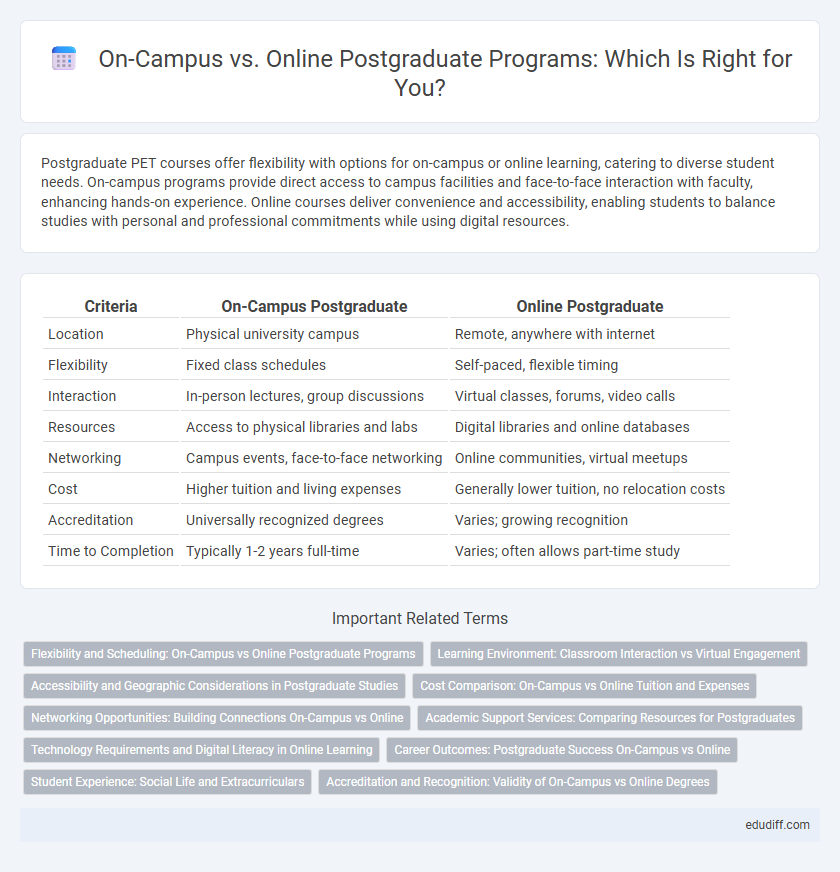Postgraduate PET courses offer flexibility with options for on-campus or online learning, catering to diverse student needs. On-campus programs provide direct access to campus facilities and face-to-face interaction with faculty, enhancing hands-on experience. Online courses deliver convenience and accessibility, enabling students to balance studies with personal and professional commitments while using digital resources.
Table of Comparison
| Criteria | On-Campus Postgraduate | Online Postgraduate |
|---|---|---|
| Location | Physical university campus | Remote, anywhere with internet |
| Flexibility | Fixed class schedules | Self-paced, flexible timing |
| Interaction | In-person lectures, group discussions | Virtual classes, forums, video calls |
| Resources | Access to physical libraries and labs | Digital libraries and online databases |
| Networking | Campus events, face-to-face networking | Online communities, virtual meetups |
| Cost | Higher tuition and living expenses | Generally lower tuition, no relocation costs |
| Accreditation | Universally recognized degrees | Varies; growing recognition |
| Time to Completion | Typically 1-2 years full-time | Varies; often allows part-time study |
Flexibility and Scheduling: On-Campus vs Online Postgraduate Programs
On-campus postgraduate programs offer structured class schedules and face-to-face interactions, which can enhance networking but limit flexibility. Online postgraduate programs provide greater flexibility with asynchronous learning options, allowing students to balance studies with work or personal commitments. This scheduling adaptability makes online programs ideal for professionals seeking to advance their education without disrupting their careers.
Learning Environment: Classroom Interaction vs Virtual Engagement
On-campus postgraduate programs offer dynamic classroom interaction where students benefit from immediate feedback, spontaneous discussions, and face-to-face networking with peers and professors. Online learning environments emphasize virtual engagement through interactive platforms, enabling flexible access to lectures, digital collaboration tools, and asynchronous communication that accommodate diverse schedules. Both modalities foster unique forms of intellectual exchange, with on-campus settings enhancing real-time social learning and online formats leveraging technology for global connectivity.
Accessibility and Geographic Considerations in Postgraduate Studies
On-campus postgraduate programs offer direct access to campus facilities, networking opportunities, and real-time academic support, beneficial for students residing near educational hubs. Online postgraduate studies provide unparalleled geographic accessibility, enabling learners from remote or international locations to pursue advanced degrees without relocation. Both formats address diverse accessibility needs, with online learning significantly reducing geographic barriers and on-campus programs enhancing immersive academic experiences.
Cost Comparison: On-Campus vs Online Tuition and Expenses
On-campus postgraduate programs typically incur higher tuition fees and additional expenses such as housing, transportation, and campus facilities, while online programs often offer lower tuition rates and eliminate commuting costs. Online graduate courses reduce overall financial burden by providing flexibility in study location, enabling students to maintain employment and avoid relocation expenses. Comparing total costs, online postgraduate education presents a more affordable option without sacrificing quality, particularly for budget-conscious students balancing work and study.
Networking Opportunities: Building Connections On-Campus vs Online
On-campus postgraduate programs offer abundant networking opportunities through in-person events, study groups, seminars, and casual interactions that foster strong professional relationships and mentorships. Online programs provide virtual networking platforms, discussion forums, and scheduled video meetups, which facilitate connections but may lack the spontaneity and depth of face-to-face engagement. Effective networking for postgraduate students depends on leveraging available resources, whether attending physical campus activities or actively participating in online communities.
Academic Support Services: Comparing Resources for Postgraduates
On-campus postgraduate students have direct access to extensive academic support services, including face-to-face tutoring, library resources, and peer study groups that foster collaborative learning environments. Online postgraduates benefit from 24/7 virtual academic support, such as digital libraries, online writing centers, and video conferencing with faculty, ensuring flexibility without compromising quality. Both modes offer tailored resources, but on-campus programs often provide immediate, hands-on assistance while online programs emphasize accessibility and digital tools for academic success.
Technology Requirements and Digital Literacy in Online Learning
Online postgraduate programs demand robust technology requirements, including a reliable high-speed internet connection, updated devices such as laptops or tablets, and access to specialized software platforms for virtual classrooms and assessments. Digital literacy is essential, as students must navigate learning management systems, participate in interactive discussions, and troubleshoot common technical issues independently. On-campus learning reduces reliance on personal technology but still benefits from digital tools for research, collaboration, and accessing academic resources.
Career Outcomes: Postgraduate Success On-Campus vs Online
Postgraduate students pursuing careers on-campus benefit from direct access to university networks, internships, and hands-on research opportunities, which significantly enhance job placement rates. Online postgraduate programs offer flexibility and access to diverse professionals worldwide, promoting skill acquisition relevant to remote and global job markets. Career outcomes for on-campus graduates often show higher immediate employment, while online graduates tend to excel in adaptability and long-term career growth.
Student Experience: Social Life and Extracurriculars
On-campus postgraduate students benefit from immersive social experiences and diverse extracurricular activities, fostering strong peer connections and networking opportunities. Campus facilities provide access to clubs, workshops, and events that enhance personal growth beyond academics. Online postgraduate programs often lack these in-person social interactions, potentially limiting students' sense of community and engagement in extracurricular pursuits.
Accreditation and Recognition: Validity of On-Campus vs Online Degrees
Accreditation is a critical factor in determining the validity of postgraduate degrees, with many top-tier institutions offering equally recognized on-campus and online programs. Regional and national accreditation bodies ensure that both formats meet rigorous academic standards, maintaining the degree's credibility in the job market. Employers increasingly accept online degrees from accredited universities, reflecting growing confidence in the quality and recognition of online postgraduate education.
On-campus vs Online Infographic

 edudiff.com
edudiff.com